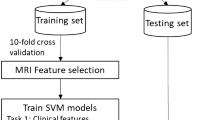Objective. TO develop a prognostic model of the development of cognitive impairments in patients with type 1 diabetes mellitus using proton magnetic resonance spectroscopy data. Materials and methods. The study included patients with type 1 diabetes mellitus (DM) and people without DM (control group). Carbohydrate metabolism was assessed in all participants, and all underwent neuropsychological testing (using the MoCA test) and proton magnetic resonance spectroscopy of the brain. Results were analyzed statistically in IBM SPSS Statistics 20.0. The prognostic model was computed by discriminant analysis. Results. Proton magnetic resonance spectroscopy data and discriminant analysis yielded a prognostic model for the development of cognitive impairments in patients with type 1 diabetes mellitus. Conclusions. The method developed here for the early diagnosis of cognitive impairments provides early prognostication of the development of cognitive impairments in patients with type 1 diabetes mellitus and can be used in clinical practice to assess the efficacy of treatment used for the prophylaxis of cognitive impairment.
Similar content being viewed by others
References
J. Aulich, Y. H. Cho, A. S. Januszewski, et al., “Associations between circulating inflammatory markers, diabetes type and complications in youth,” Pediatr. Diabetes, 20, No. 8, 1118–1127 (2019), https://doi.org/10.1111/pedi.12913.
G. J. Biessels, S. Staekenborg, E. Brunner, C. Brayne, and P. Scheltens, “Risk of dementia in diabetes mellitus: a systematic review,” Lancet Neurol., 5, 64–74 (2006), https://doi.org/10.1016/S1474-4422(05)70284-2.
A. M. A. Brands, G. J. Biessels, E. H. F. de Haan, et al., “The Effects of type 1 diabetes on cognitive performance: A meta-analysis.,” Diabetes Care, 28, No. 3, 726–735 (2005), https://doi.org/10.2337/diacare.28.3.726.
C. T. Kodl and E. R. Seaquist, “Cognitive dysfunction and diabetes mellitus,” Endocr. Rev., 29, No. 4, 494–511 (2008), https://doi.org/10.1210/er.2007-0034.
D. Selvarajah, I. D. Wilkinson, C. J. Emery, et al., “Thalamic neuronal dysfunction and chronic sensorimotor distal symmetrical polyneuropathy in patients with type 1 diabetes mellitus,” Diabetologia, 51, No. 11, 2088–2092 (2008), https://doi.org/10.1007/s00125-008-1139-0.
X. Zhao, Q. Han, Y. Lv, et al., “Biomarkers for cognitive decline in patients with diabetes mellitus: evidence from clinical studies,” Oncotarget, 9, No. 7, 7710–7726 (2017), https://doi.org/10.18632/oncotarget.23284.
Yu. G. Samoilova, M. A. Rotkank, N. G. Zhukova, et al., “Application of magnetic resonance methods of brain research in patients with type 1 diabetes mellitus and cognitive dysfunction,” Nevrol. Zh., 23, No. 2, 86–92 (2018).
Yu. G. Samoilova, M. A. Rotkank, N. G. Zhukova, et al., “Glycemic variability in patients with type 1 diabetes mellitus: relationship with cognitive dysfunction and magnetic resonance investigations,” Prob. Endokrinol, 64, No. 5, 286–291 (2018).
Yu. G. Samoilova, M. A. Rotkank, N. G. Zhukova, et al., “Markers of cognitive impairment and glycemic variability in patients with type 1 diabetes,” Zh. Nevrol. Psikhiat., 118, No. 4, 48–51 (2018).
C. Tonoli, E. Heyman, B. Roelands, et al., “Type 1 diabetes-associated cognitive decline: a metaanalysis and update of the current literature,” J. Diabetes, 6, No. 6, 499–513 (2014), 10.1111/1753-0407.12193.
E. R. Danielsen and B. Ross (eds.), Magnetic Resonance Spectroscopy Diagnosis of Neurological Disease, Marcel Dekker, New York (1999).
I. M. Burtscher and S. Holtas, “Proton MR spectroscopy in clinical routine,” J. Magn. Reson. Imag., 13, No. 4, 560–567 (2001).
Author information
Authors and Affiliations
Corresponding author
Additional information
Translated from Zhurnal Nevrologii i Psikhiatrii imeni S. S. Korsakova, Vol. 120, No. 3, Iss. 1, pp. 19–22, March, 2020.
Rights and permissions
About this article
Cite this article
Samoilova, Y.G., Rotkank, M.A., Kudlay, D.A. et al. A Prognostic Model of the Development of Cognitive Impairments in Patients with Type 1 Diabetes Mellitus. Neurosci Behav Physi 50, 1136–1139 (2020). https://doi.org/10.1007/s11055-020-01015-9
Received:
Accepted:
Published:
Issue Date:
DOI: https://doi.org/10.1007/s11055-020-01015-9




